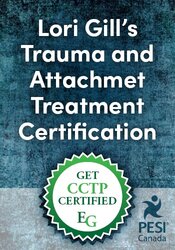
Trending Topics:
×

Trauma therapy can feel frustrating when clients hit roadblocks. Without a clear framework, progress stalls, leaving both clinicians and clients feeling stuck. The truth is, talk therapy alone isn’t enough—trauma needs a structured, integrative approach.
In this training, you’ll learn about Phase Based Clinical Applications for working with complex trauma and will be introduced to the Integrative Trauma and Attachment Treatment Model (ITATM®)—a practical, step-by-step framework designed to help trauma clients depotentiate, process and integrate past trauma experiences so they can heal effectively. This isn’t just theory—it’s an actionable method you can start using right away. ITATM® integrates sensory processing, somatic therapy, art, visualization, bilateral stimulation, resourcing, and reframing, using a structured, bottom-up protocol.
NOTE: Tuition includes one free CE Certificate (participant will be able to print the certificate of completion after passing the online post-test (80% passing score) and completing the evaluation). Instructional methods will include PowerPoint, didactic lecture, and others.
Continuing Education Information: Listed below are the continuing education credit(s) currently available for this non-interactive self-study package. Program content is reviewed periodically per accrediting board rules for currency and appropriateness for credit. Credit approvals are subject to change. Please note, your licensing board dictates whether self-study is an acceptable form of continuing education, as well as which credit types are acceptable for continuing education hours. Please refer to your licensing board's rules and regulations. If your profession is not listed, please contact your licensing board to determine your continuing education requirements and check for reciprocal approval.
For other credit inquiries not specified below, please contact info@pesi.com or 800-844-8260 before purchase.
Materials that are included in this course may include interventions and modalities that are beyond the authorized practice of your profession. As a licensed professional, you are responsible for reviewing the scope of practice, including activities that are defined in law as beyond the boundaries of practice in accordance with and in compliance with your profession's standards.
For Planning Committee disclosures, please see the statement above. For speaker disclosures, please see the faculty biography. Evergreen Certifications is owned by PESI, Inc.
Earn up to 11.25 CE hours. Please see below, for more details, as credit amounts vary by jurisdiction and profession.
PESI, Inc. is approved by the Canadian Counselling and Psychotherapy Association to offer continuing education for counsellors and psychotherapists. PESI, Inc. maintains responsibility for the program. This self-study activity is approved for 11.0 credit hours.

PESI, Inc., #1062, is approved as an ACE provider to offer social work continuing education by the Association of Social Work Boards (ASWB) Approved Continuing Education (ACE) program. Regulatory boards are the final authority on courses accepted for continuing education credit. ACE provider approval period: January 27, 2026 - January 27, 2029. Social workers completing this course receive 11.5 Clinical continuing education credits.
Course Level: Intermediate Format: Recorded asynchronous distance. Full attendance is required; no partial credits will be offered for partial attendance.
Canadian Social Workers: Canadian provinces may accept activities offered by providers approved by the ASWB ACE program for ongoing professional development.
This self-study activity qualifies for 11.25 continuing education clock hours as required by many national and local licensing boards and professional organizations. Save your activity advertisement and certificate of completion, and contact your own board or organization for specific requirements.
| File type | File name | Number of pages | |
|---|---|---|---|
| Manual - Lori Gill’s Trauma and Attachment Treatment Certification (8.6 MB) | 114 Pages | Available after Purchase | |
| Manual - Lori Gill’s Trauma and Attachment Treatment Certification - French (8.5 MB) | 114 Pages | Available after Purchase | |
| Manual - Lori Gill’s Trauma and Attachment Treatment Certification - German (8.5 MB) | 114 Pages | Available after Purchase | |
| Manual - Lori Gill’s Trauma and Attachment Treatment Certification - Italian (8.5 MB) | 114 Pages | Available after Purchase | |
| Manual - Lori Gill’s Trauma and Attachment Treatment Certification - Spanish (8.5 MB) | 114 Pages | Available after Purchase | |
| Extra Handout - Supplement (1.9 MB) | 47 Pages | Available after Purchase |
Access never expires for this product.
Visit our FAQ page at https://www.pesicanada.ca/faq or contact us at https://www.pesicanada.ca/contact-us.
Foundations of Trauma and the ITATM® Framework
Application, Integration & Practical Skills
| 5 |
|
| 4 |
|
| 3 |
|
| 2 |
|
| 1 |
|
Satisfaction Guarantee
Your satisfaction is our goal and our guarantee. Concerns should be addressed to info@pesicanada.com.
Please wait ...